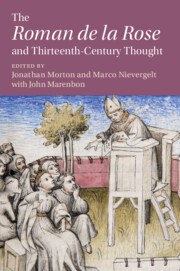Refine search
Actions for selected content:
4 results
Chapter 8 - Arts of Love and Justice
-
-
- Book:
- Literary Theory and Criticism in the Later Middle Ages
- Published online:
- 20 April 2023
- Print publication:
- 20 April 2023, pp 159-179
-
- Chapter
- Export citation

The ‘Roman de la Rose' and Thirteenth-Century Thought
-
- Published online:
- 17 June 2020
- Print publication:
- 16 July 2020
Chapter 14 - The French Context
- from Part II - Books, Discourse and Traditions
-
-
- Book:
- Geoffrey Chaucer in Context
- Published online:
- 24 June 2019
- Print publication:
- 11 July 2019, pp 117-125
-
- Chapter
- Export citation
Part II - Books, Discourse and Traditions
-
- Book:
- Geoffrey Chaucer in Context
- Published online:
- 24 June 2019
- Print publication:
- 11 July 2019, pp 25-154
-
- Chapter
- Export citation
